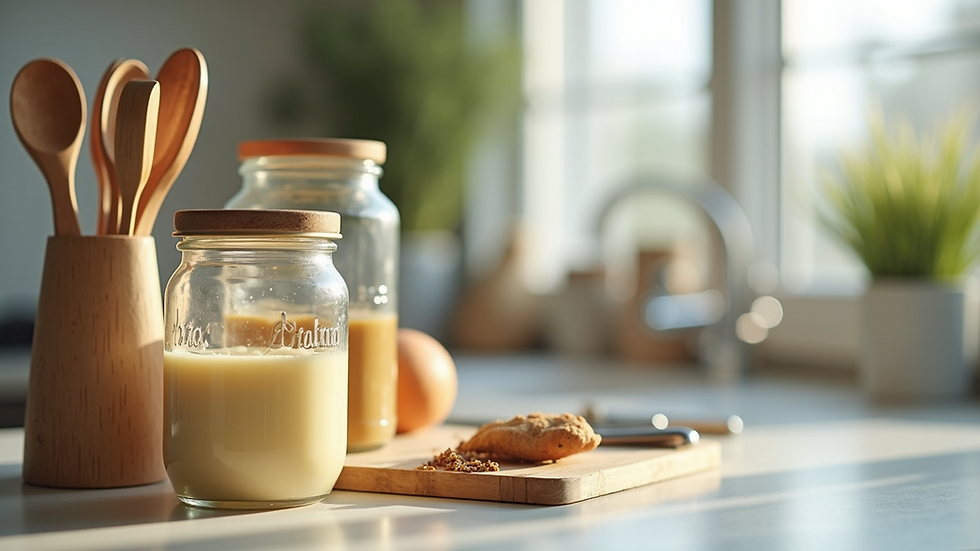Eco-Friendly Products You Need in Your Home
- brm6129
- Nov 8
- 4 min read
Every day, the choices we make at home affect the environment more than we realize. From the energy we use to the products we buy, small changes can add up to a big difference. Choosing eco-friendly products is one of the simplest ways to reduce your carbon footprint and create a healthier living space. This post explores essential eco-friendly products that can transform your home into a sustainable haven.

Why Choose Eco-Friendly Products?
Switching to eco-friendly products helps reduce waste, conserve natural resources, and limit pollution. Many conventional household items contain harmful chemicals or are made from non-renewable materials. Eco-friendly alternatives often use sustainable materials, are biodegradable, or designed for reuse. This means less plastic in landfills, fewer toxins in your home, and a smaller environmental impact overall.
Besides environmental benefits, these products often improve indoor air quality and promote healthier living. For example, natural cleaning products avoid harsh chemicals that can irritate skin or lungs. Choosing eco-friendly also supports companies committed to ethical manufacturing and fair labor practices.
Essential Eco-Friendly Products for Your Kitchen
The kitchen is a great place to start making sustainable swaps. Here are some must-have eco-friendly items:
Reusable Food Storage
Replace single-use plastic wrap and bags with reusable silicone bags, beeswax wraps, or glass containers. These options keep food fresh without creating plastic waste.
Bamboo Utensils and Cutting Boards
Bamboo grows quickly and requires fewer resources than hardwood. Bamboo kitchen tools are durable, naturally antibacterial, and compostable at the end of their life.
Energy-Efficient Appliances
Look for appliances with Energy Star ratings. They use less electricity and water, saving money and reducing your home's carbon footprint.
Compost Bin
Composting food scraps reduces landfill waste and creates nutrient-rich soil for gardening. A small countertop compost bin makes it easy to collect scraps daily.
Eco-Friendly Cleaning Products That Work
Many conventional cleaning products contain chemicals that harm the environment and your health. Switching to eco-friendly cleaning supplies can make a big difference:
Natural All-Purpose Cleaners
Products made from vinegar, baking soda, or plant-based ingredients clean effectively without toxic fumes.
Refillable Cleaning Bottles
Choose brands that offer refill stations or concentrate refills to reduce plastic waste.
Reusable Cleaning Cloths
Replace disposable paper towels with washable microfiber or cotton cloths. They clean well and last for hundreds of uses.
Biodegradable Sponges and Brushes
Look for cleaning tools made from natural fibers like coconut husk or cellulose that break down safely after use.
Sustainable Bathroom Products to Consider
The bathroom is another area where eco-friendly swaps can reduce waste and exposure to chemicals:
Bamboo Toothbrushes
These are biodegradable and a great alternative to plastic toothbrushes that take centuries to decompose.
Natural Soaps and Shampoos
Choose products free from synthetic fragrances, sulfates, and microbeads. Many come in plastic-free packaging or bars.
Reusable Cotton Rounds
Replace disposable cotton pads with washable rounds made from organic cotton or bamboo.
Water-Saving Showerheads
Low-flow showerheads reduce water use without sacrificing pressure, helping conserve a precious resource.
Eco-Friendly Home Textiles
Textiles like bedding, towels, and curtains can also impact the environment. Here are some sustainable options:
Organic Cotton or Linen Bedding
These materials are grown without harmful pesticides and use less water than conventional cotton.
Recycled or Natural Fiber Rugs
Rugs made from jute, sisal, or recycled materials reduce reliance on synthetic fibers.
Eco-Friendly Laundry Detergents
Choose detergents that are phosphate-free and biodegradable to protect waterways.
Energy-Efficient Washing Machines
Modern machines use less water and energy, especially when paired with cold water detergents.
Green Energy and Lighting Solutions
Reducing energy consumption is key to lowering your home's environmental impact:
LED Light Bulbs
LED bulbs use up to 80% less energy than traditional incandescent bulbs and last much longer.
Smart Thermostats
These devices learn your schedule and adjust heating and cooling to save energy without sacrificing comfort.
Solar Chargers and Panels
Solar-powered chargers for small devices reduce electricity use. Installing solar panels can significantly cut your home's carbon footprint.
Energy-Efficient Windows and Insulation
Proper insulation and double-glazed windows keep your home warm in winter and cool in summer, reducing heating and cooling needs.
Practical Tips for Choosing Eco-Friendly Products
When shopping for eco-friendly products, keep these tips in mind:
Check Certifications
Look for labels like USDA Organic, Fair Trade, Energy Star, or Forest Stewardship Council (FSC) to verify claims.
Avoid Single-Use Items
Prioritize reusable, refillable, or biodegradable products.
Consider Product Lifespan
Durable products reduce waste by lasting longer.
Buy Local When Possible
Local products often have a smaller carbon footprint due to reduced transportation.
Research Brands
Support companies with transparent, ethical practices.
How Small Changes Add Up
Switching to eco-friendly products might seem like a small step, but it creates a ripple effect. For example, using reusable bags and containers reduces plastic waste that harms oceans and wildlife. Choosing natural cleaning products improves indoor air quality and protects water sources. Over time, these choices save money, reduce waste, and promote a healthier lifestyle.
By making thoughtful purchases, you also encourage manufacturers to prioritize sustainability. Consumer demand drives innovation and helps shift markets toward greener options.
Final Thoughts on Building a Sustainable Home
Transforming your home with eco-friendly products is a practical way to live more sustainably. Start with one room or product category and gradually expand your efforts. Each eco-friendly swap reduces your environmental impact and creates a safer, healthier space for you and your family.
Take action today by identifying one product you can replace with a greener alternative. Whether it’s switching to bamboo utensils, using natural cleaners, or installing LED bulbs, every choice counts. Your home can be a place where comfort and sustainability go hand in hand.
This content is for informational purposes only and does not replace professional advice. Always research products and consult experts when needed.



Comments